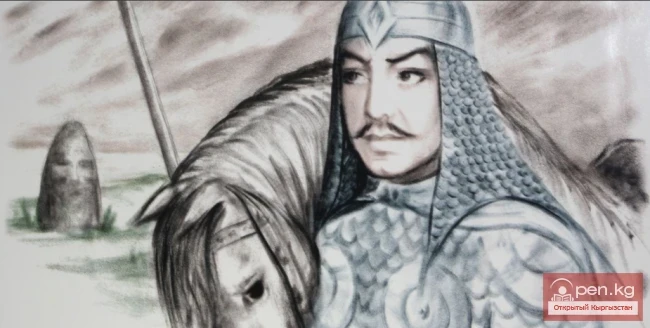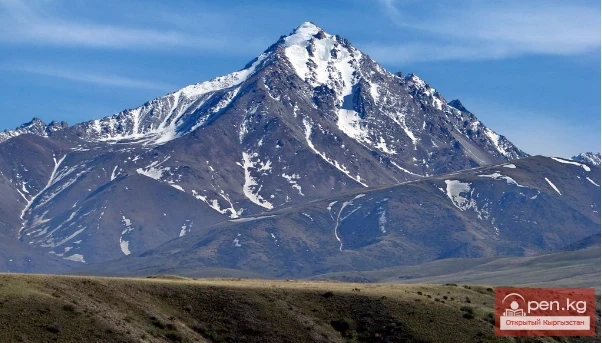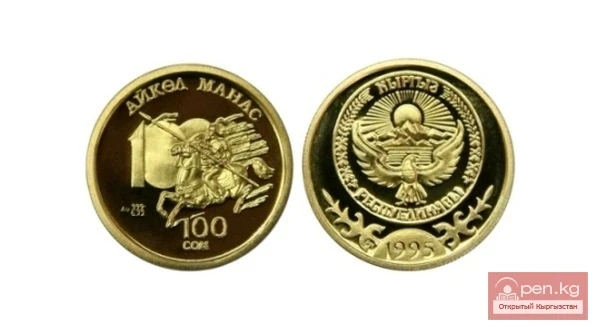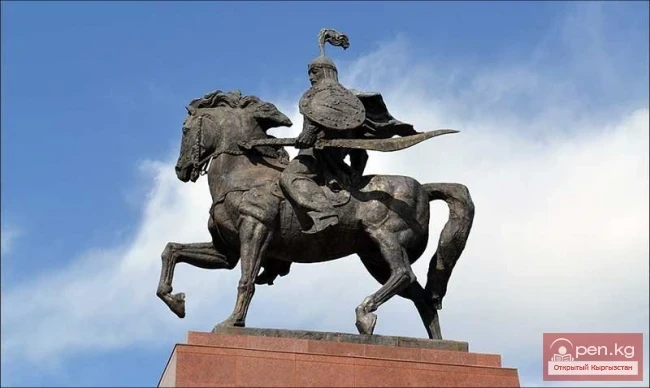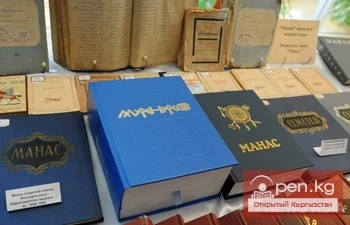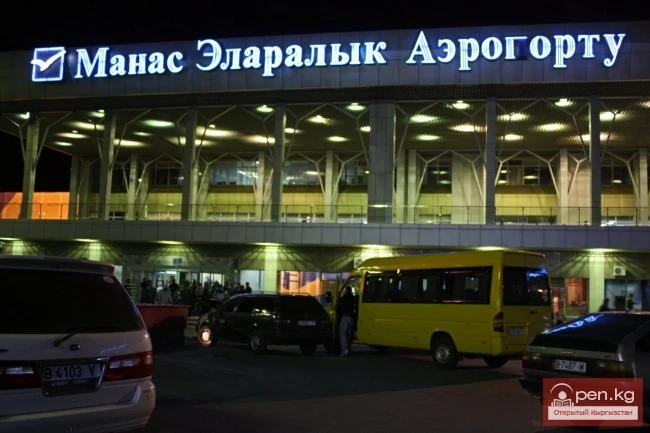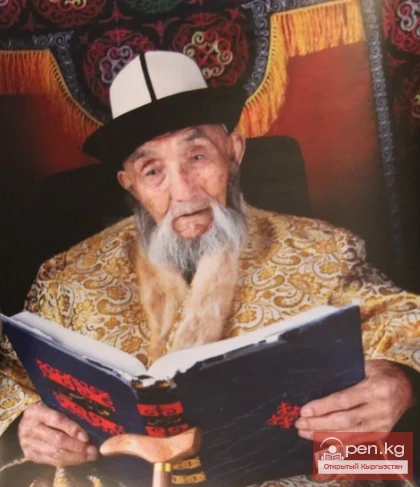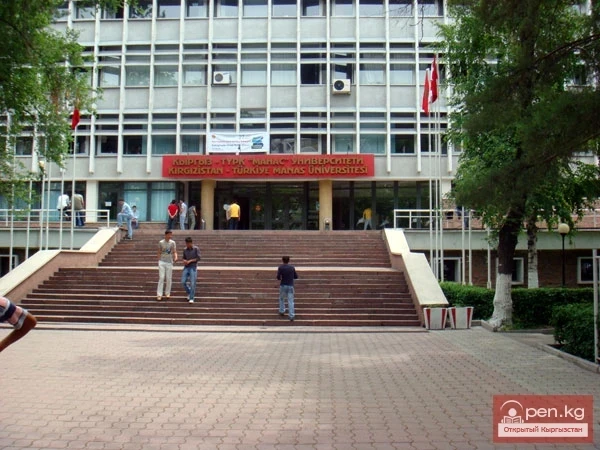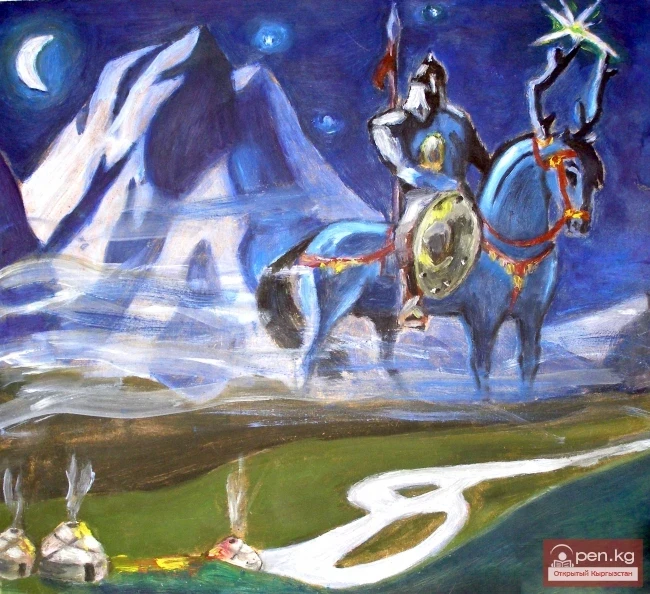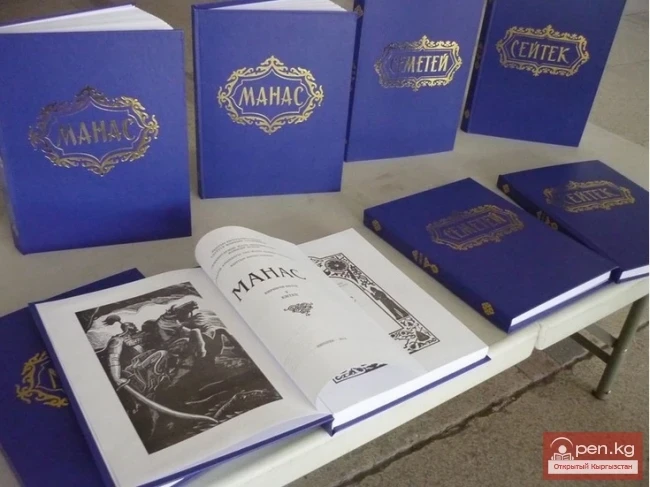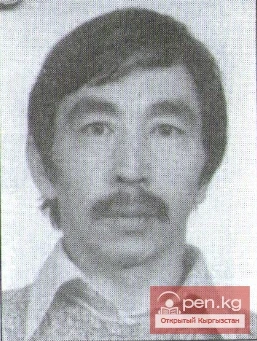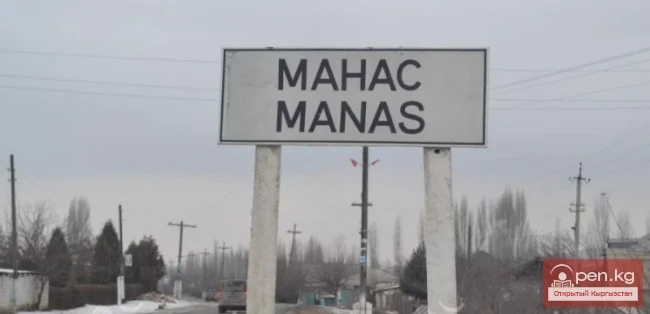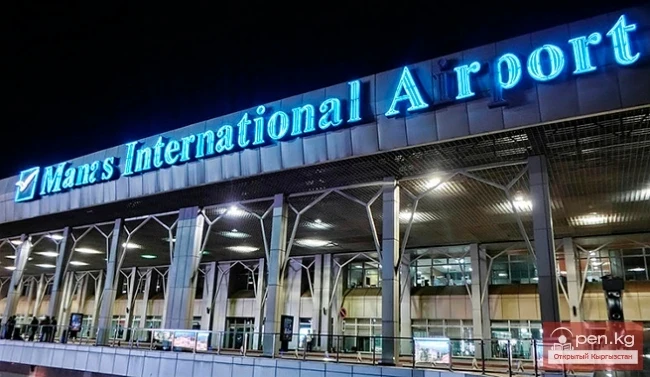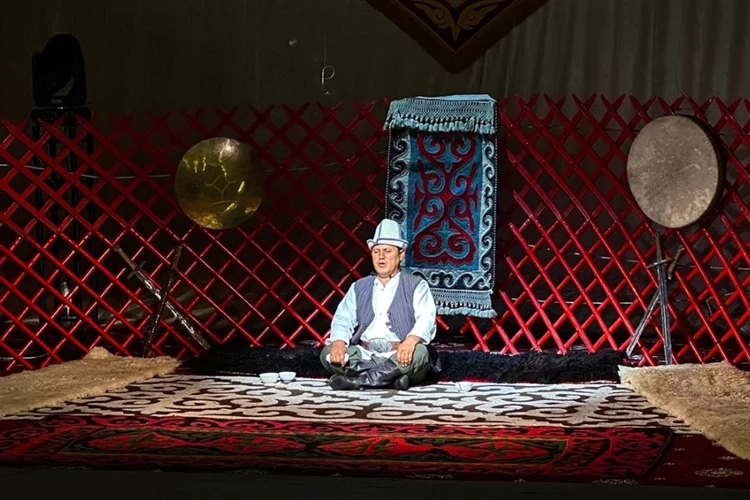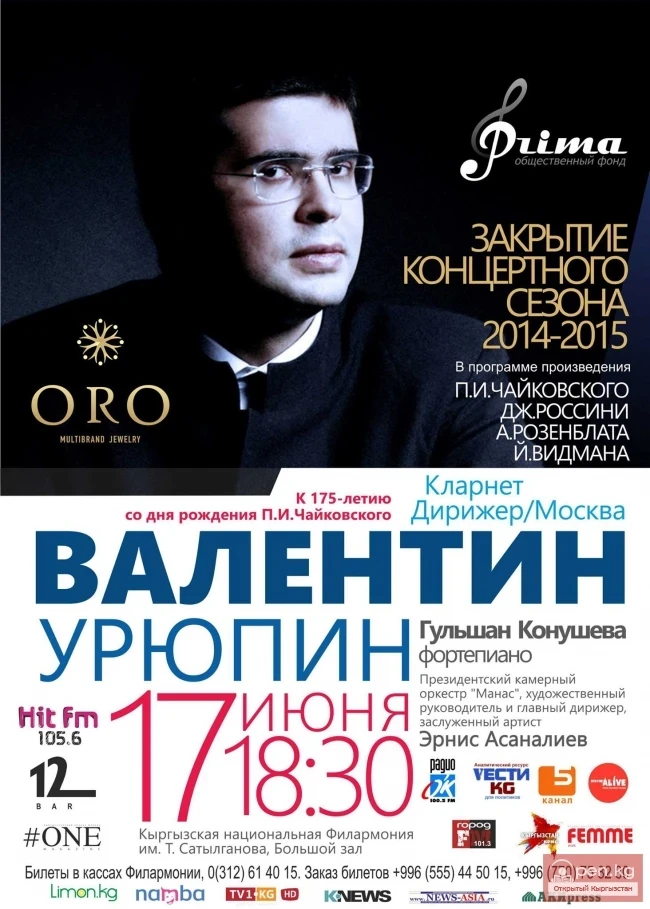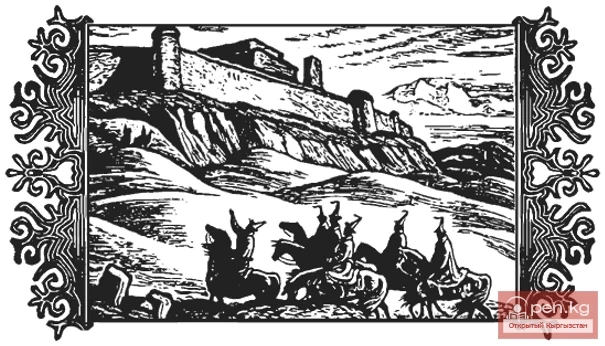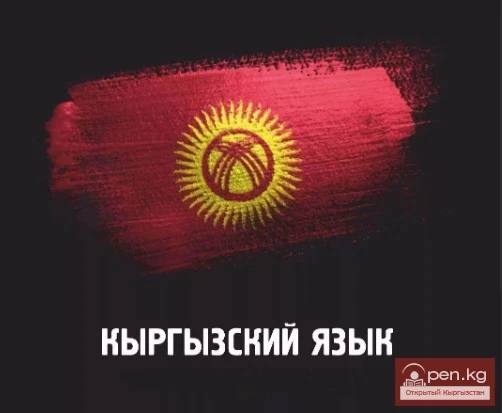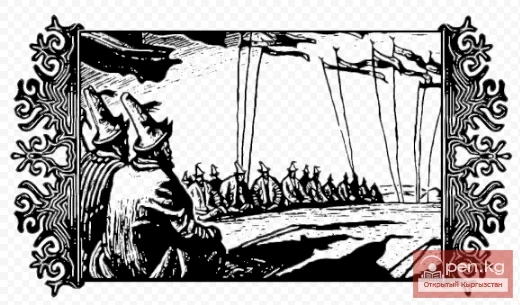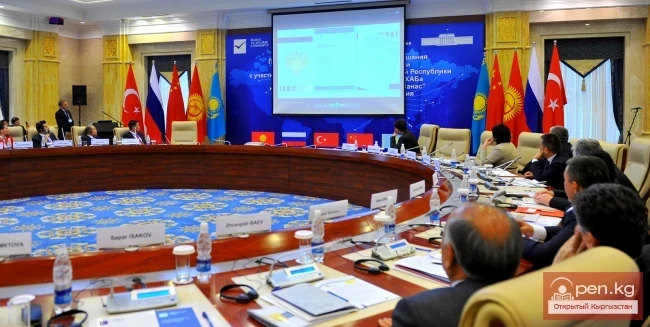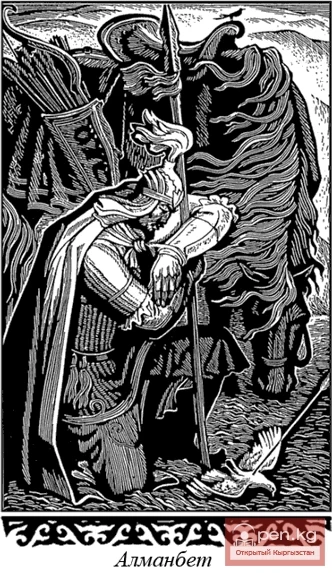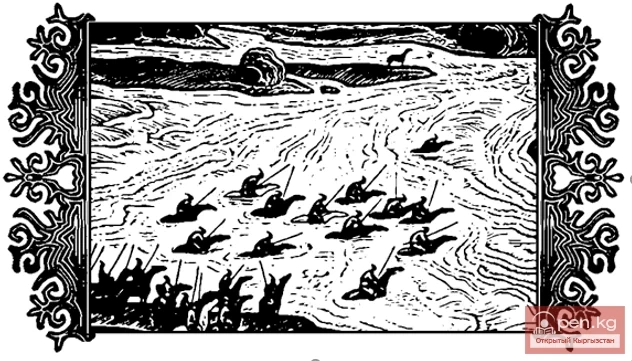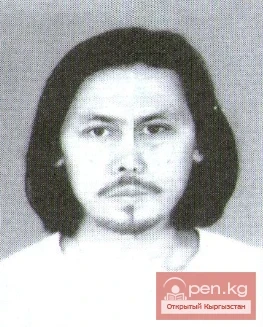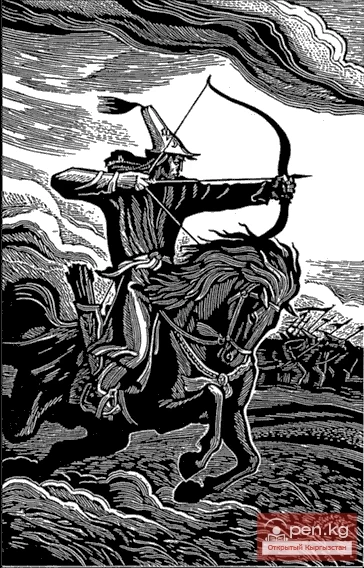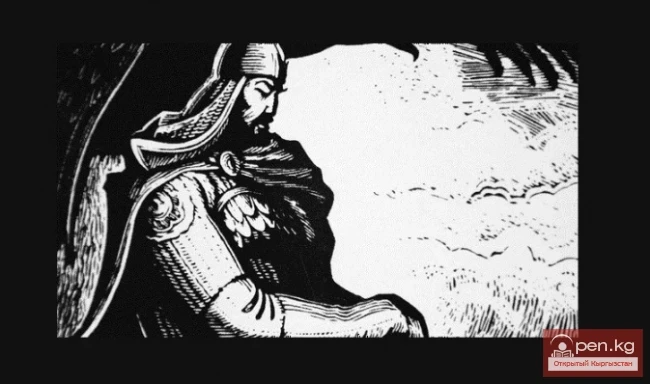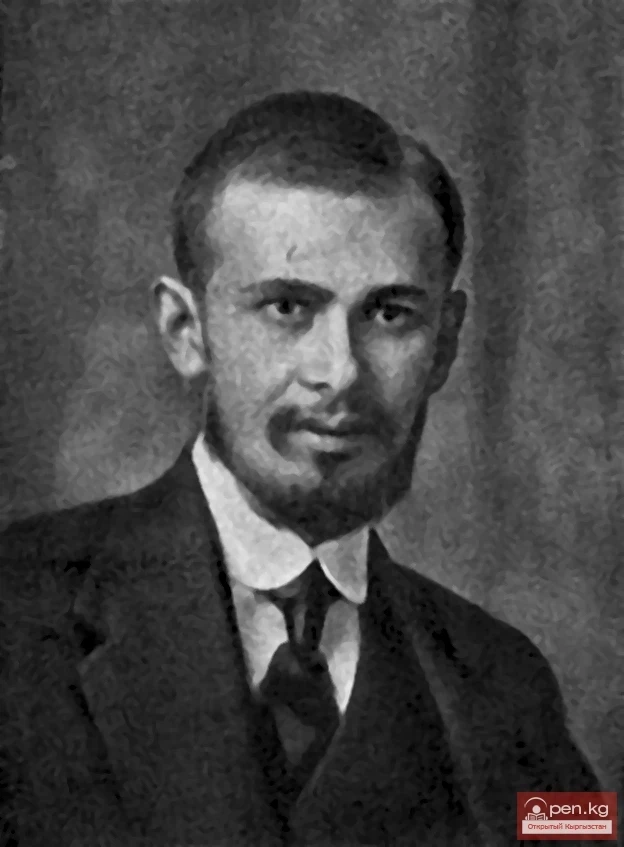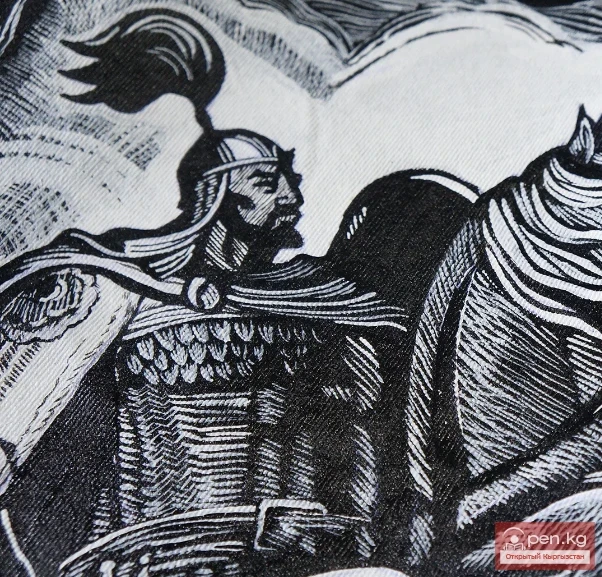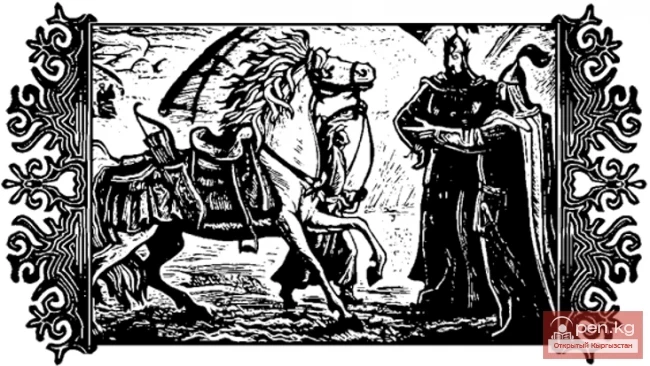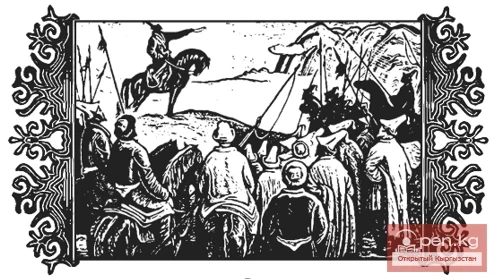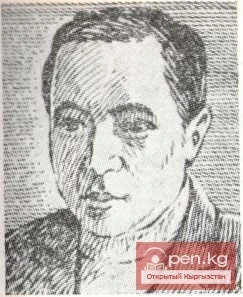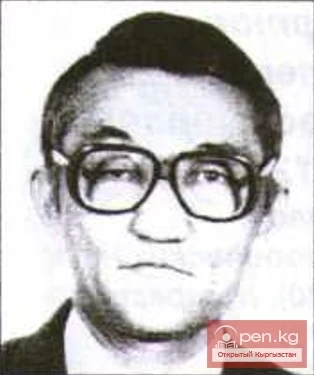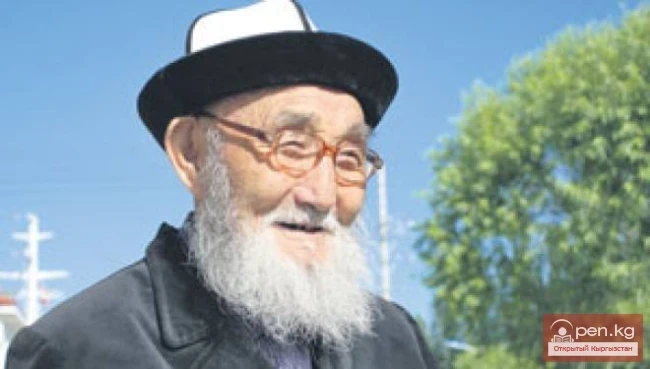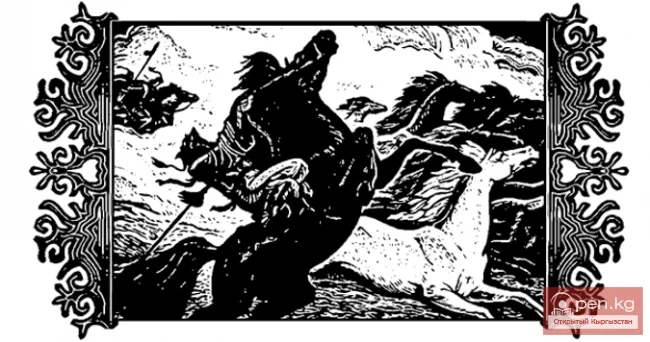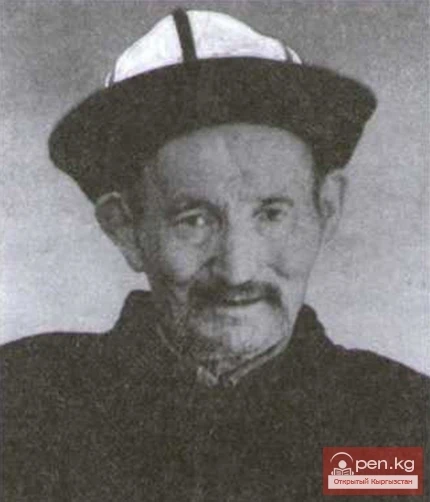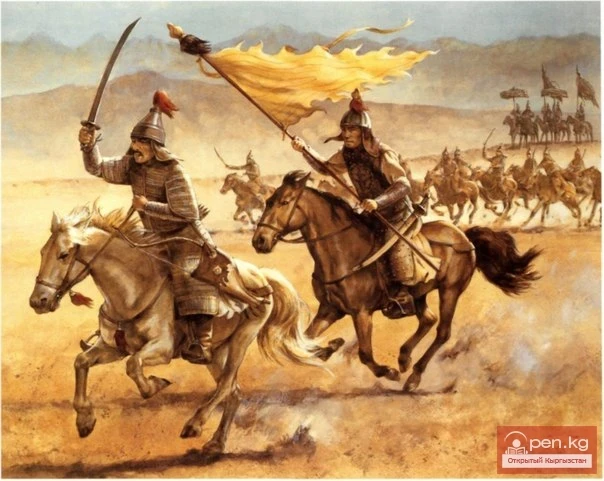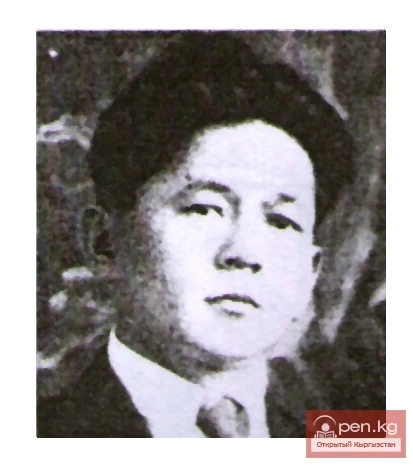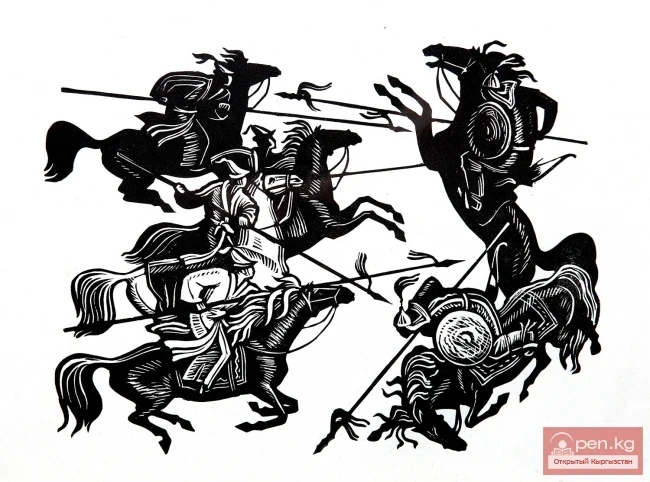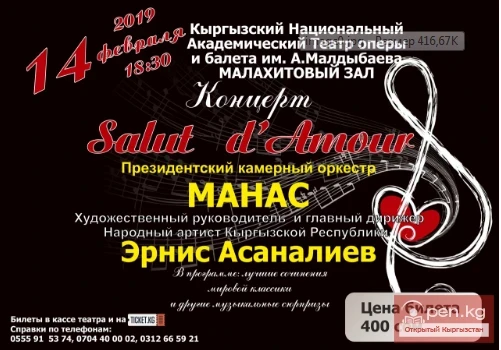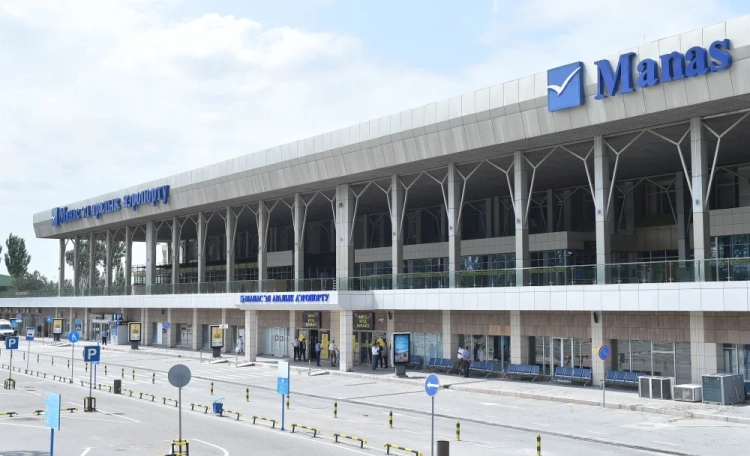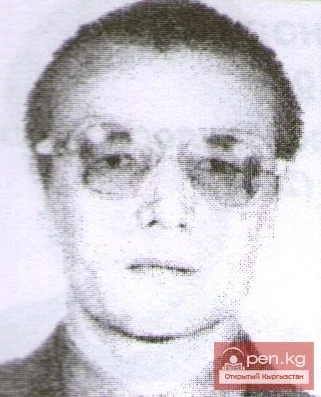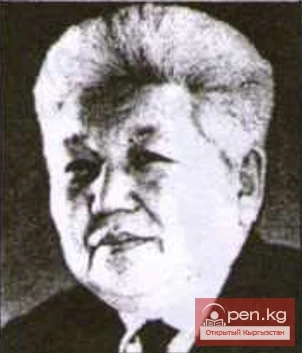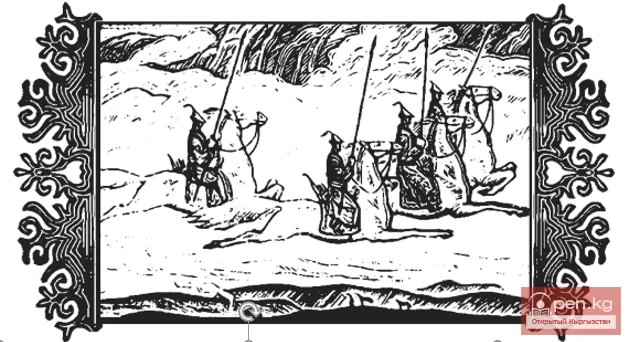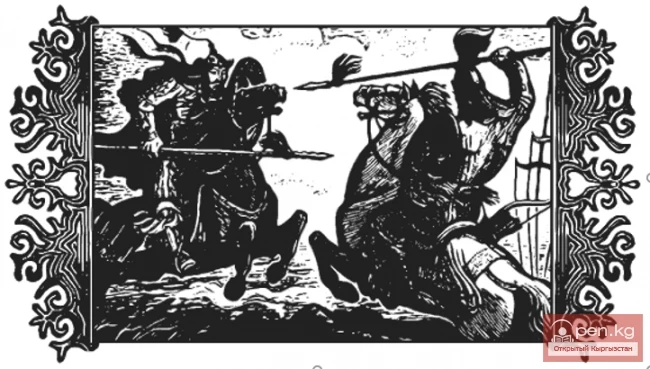ABOUT HOW MANAS WENT TO SEARCH FOR KOSHOY
When the sun rose and the surroundings brightened, Manas woke up, stretched sweetly, and got up from the place where he had slept. He woke up forty of his friends and went to the spring on the outskirts of the village. He washed his face with spring water, and his body felt refreshed.
Just as he was about to return, he saw a gray wolf and was surprised. Manas walked on – the wolf followed him; Manas stopped – the wolf did too. Hoping to scare off the beast, Manas threw a stone at it, but it didn’t help.
Seeing the wolf, various thoughts raced through Manas's mind, his body tensed up, and he strapped on his sword, took a club in his hands, and equipped himself with various gear. The forty boys also mounted their horses, raised a terrible cry, and chased after the wolf. They chased for a long time through the mountains and valleys, but they could not catch up with the wolf; only the young Manas finally caught up to it and was just about to strike it with his club when, out of nowhere, forty people suddenly appeared. And unexpectedly, five more people approached from behind the next hill, led by Shai-ata. Surprised, Manas hurriedly greeted the elders:
– Assalam-alaikum!
– Alaikum-assalam!
Together with Shai-ata, all forty chiltans shook hands with Manas.
– My son, Manas, – said Shai-ata, handing him a coat made of ыпчи. – I gift you this coat. It is good for battles; no arrow can pierce it; it does not burn in fire, no matter how much you pull, it does not tear; it never wears out, with a golden collar and copper sleeves, a double armor with small rings like the eye of a lark. It is just right for heroes like you, going on a great campaign. Put on this armor from Khizr, remember everything I say. I respect your strength and honor your heroism. If you wear this armor, you will not burn even in fire. Your enemy will not be able to pierce you with a sword or chop you with an axe. The Creator has given you the power of a leopard and the strength of a lion; He has made you happier and luckier. Now no one will be able to defeat you. From now on, I will accompany you on your journey, and when you charge into the enemy camp with a battle cry, I will always be by your side. These people surrounding you are chiltans; befriend them. Those five people on the hill also came to befriend you and greet you.
Shai-ata called out one of the forty boys, Chege, son of Oshpur. Chege immediately rushed over and knelt down.
– What is your name, my son?
– Chege.
– Is that even a name? From this day on, you will be called Kutubiy. May this name bring you luck, my son.
– Thank you, father.
– My son Manas, listen to me until the end. You and Kutubiy must become eternal friends. He will bring you luck ahead, and behind you will be the support of countless troops. This young man is created for your happiness, a hero, clairvoyant, and resourceful. He will always be by your side, and in the great campaign, he will be your banner. He will gather everything you have lost, unite everything that has been torn apart, and will always be with you in joy and sorrow. No matter what happens in life, he will be patient and enduring; even at the gates of purgatory, this Kutubiy will be your friend.
Shai-ata made Manas and Kutubiy eat flour made from white wheat, taste salt, and united them in friendship. And then, as if he had vanished into thin air, he disappeared from sight along with the forty chiltans.
One day, forty families of Kyrgyz were celebrating and having a noisy good time. Suddenly, with his white beard shining, Akbalta began his speech:
– My dear compatriots, I have something I have long wanted to discuss with you. In those distant years, when the Kara-Kalmyks, Chinese, and Manchus captured our lands, plundered our people, killed many of our warriors, and scattered the rest across the world, only one khan, Ulak, remained with his people in the homeland of Ala-Too. So, it turns out, he is still alive. I have inquired among the people. After all, we, who found ourselves in Altai, lost all connection with our relatives, and out of fear of the Kalmyks, we did not dare to lift our heads. They say that the rich man Jakyp has a brother from his father, Usen, who was taken all the way to Beijing; his son was named Kozkaman, accepted into Kalmyk faith, married to a Kalmyk woman, and their children were named: Kokchokoz, Dorbolday, Barbolday. It turns out they have forgotten the Kyrgyz language, renounced our religion, and have turned into Kalmyks.
Akbalta glanced at Manas and continued:
– My dear Manas, my foal! From a young age, you have become strong; your feats and heroism are on everyone's lips; even the Chinese and Kalmyks know you. You have done things that not everyone would dare to do. You destroyed the envoy and his numerous army sent to us from the capital. You inflicted irreparable damage on them. But what if an immeasurable number of troops from the eternal Chinese come here? How will we cope? What if we simply attack them and remain here in Altai?
Akbalta looked questioningly at his people.
– Uncle Akbalta, you have seen much in your lifetime. Perhaps you will find a way for us? – Jakyp broke the silence that had enveloped the crowd for a while.
When no one from the people could answer the question, Akbalta continued:
– My son Manas, if Esen-khan sends an army here again, it will be ten thousand men. We do not have such strength; we cannot defeat them. We will exhaust our resources, use our livestock; it is better to return to our homeland, to Ala-Too. What do you think?
Most of those present murmured in agreement:
– Akbalta speaks rightly.
– There is no better place for us than our homeland!
– It is better for us to return to our native land.
Happy that his thoughts coincided with the opinion of the majority, Akbalta continued his speech:
– Then let’s do this. There is your uncle there, the extraordinary hero Koshoy, different from all men; unafraid even if sixty thousand warriors come; eager for battle as soon as he hears the call; dressed in the strongest armor; riding a spotted horse, like a cheetah. Let Manas go to Chech-Dobo, which is in At-Bashi, where the khan of the katagans Koshoy lives, who has united the defeated Kyrgyz, gathered the scattered people into one fist, built a stone fortress, become a ruler for his wisdom and agility, not allowing anyone to harm his people and ruling justly. We should consult this man about the relocation and settlement of people, about how we should live further. What do you say to that?
– Dear compatriots! Uncle Akbalta speaks of a worthwhile matter. Indeed, we need to go to Ala-Too, – supported Akbalta Jakyp.
– A lot of time has passed since then; I have learned that in Chon-Kemine lives another one of the Kyrgyz sons, Er Urbu, who earns his living through hard work and sweat, raises livestock, has acquired wealth, and has become respected by the people. Moreover, he is famous for his eloquence. He can also become your support.
The young Manas listened carefully to all of Akbalta's advice until the end. He understood that the Altai land would not become a homeland for the Kyrgyz, and the Kalmyks and Chinese would not be close peoples. Together with his forty friends, the young Manas set out on his journey.
Day and night they traveled, occasionally crossing passes, traversing many mountains and rivers, riding on swift steeds; they saw many beautiful landscapes along the way, passing through the lands of Kiyas and Tekes.
There in the mountains, there is snow; in the foothills, there are thickets and diverse forests; in the hollows, there are hares; in the depths, there are snakes; on the plains, there are goats; on the hills, there are deer; on the slopes, there are argalis; in the clearings, there are foxes; in the steppes, there are onagers; and what to say, they passed through all the areas where animals of the earth roamed.
Having crossed the mountains and traveled many paths, longing for his homeland, Manas did not close his eyes even once, did not rest anywhere, and after crossing the pass of Bely-Moynok, reached the lands of Uch-Karkyra. Here, the fescue and feather grass, the zhen and wormwood grew waist-high. In the hilly wide steppe, in various places, there were marals, resembling light-red bald cows, who had never encountered people before, and they ran away in fright. After crossing Uch-Karkyra, descending the slope of Kyzyl-Kiya, and seeing the blue lake ahead, Manas was greatly delighted and asked Azhybay, who was riding next to him:
– Hey, Azhybay, is there really such a beautiful lake and such a wonderful land? This amazing lake, embodying the character of the Kyrgyz, should not be shown to envious eyes, should not be allowed to be stepped on by dirty feet, should not be grasped by greedy hands.
– Manas, we have seen many beautiful places since we were in Altai. But this lake, it turns out, is more beautiful than all of them.
– Look, Azhybay, from various hollows flows a multitude of pure, transparent waters; along the shores, there are black currants and impenetrable thickets; in the forests, various birds sing; in the mountains, firs grow, and junipers please the eye. Deer and ibexes, goats and rams, argalis and mountain rams graze everywhere. Tigers and leopards, leopards and lynxes inhabit this land. On this sacred land, the sick will quickly recover, the old will rejuvenate, and the poor will become rich. Oh, how beautiful Issyk-Kul is!
– You are right, Manas, Issyk-Kul is a paradise on earth.
– Oh, Azhybay, because of such beauty of the lake, because of such wealth of the land, how many bloody battles there will be, how many heads of heroic warriors will roll on the ground like balls, how many tears will be shed! And all this because of you, dear Issyk-Kul.
He carefully dipped his hand in the water and washed his face. Then he wrapped his arms around his forehead and made a kind wish:
– Our dear lake, do not let your eternal holiness be squandered, bring luck to our people. May your beauty and wealth show mercy to the Kyrgyz people for centuries.
All forty of his friends supported his kind wish. They traveled along the shore of the lake for a long time, and even after they passed it, they could not immediately tear themselves away from it and looked back for a long time. The sacred lake played with waves and sent the young Manas and his forty friends off with a good farewell. Everything around was permeated with enchanting beauty.
– Let’s go, Azhybay, – Manas interrupted the thoughts of the pensive Azhybay. – What, are you missing your father and mother?
– No, my friend. I am just admiring the beauty of the lake. In my life, I have not only not seen but also have never heard of such beauties of the earth.
– To each their own, they say, my Azhybay. And it turns out our people also like such a wonder; may the Lord bring us luck.
– May luck be with you, my hero. May your wishes come true, and the lake bring prosperity to our people.
– Azhybay, let’s hasten our way to the khan of the katagans in At-Bashi. We will talk and consult with him. If he agrees, we will take him with us, make him both a leader and an advisor, and drive the Altai Kalmyks and Kara-Chinese all the way to Beijing. If fate favors us, we will deal with the Kalmyks, Chinese, and Manchus.
Forty warriors led by the young Manas hurried on their way towards At-Bashi.
The Tale of Manas. The Decision of Esen-khan to Capture Manas
